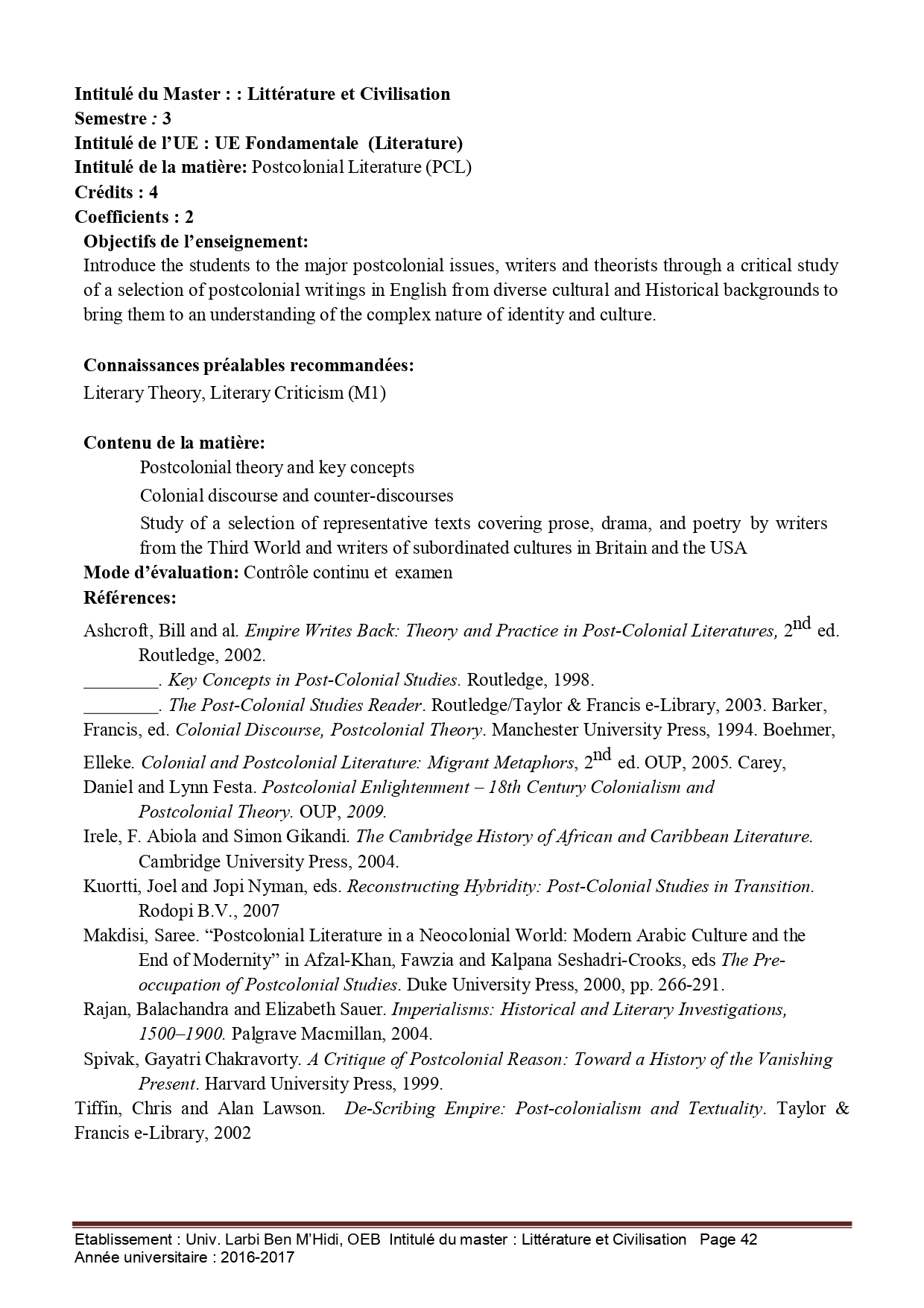Larbi Ben M'hidi - University of Oum El Bouaghi
Course Title: Postcolonial Literature ( PoCo Lit)
Tutor: Ms. Mordjana Haddad
Rank: Assistant Lecturer
Affiliation Institution: University Of Oum El Bouaghi, the Department of English Language
email: mordjana.haddad@univ-oeb.dz

By the end of the semester (S3), M2 students will be able to:
- Critically read literary texts by applying Postcolonial Theory/Criticism
- Learn main Postcolonial concepts/terms and figures
- Understand that Postcolonial Theory is universal and not limited to former colonized literature.
Master 2 students of Literature and Civilization
Students are expected to:
- have previously learned (during the graduation and post-graduation levels) the main components of literary texts ( structure/plot, character, narrator....) and how to apply some literary theories ( Formalism, Feminism, Psychoanalysis, Marxism...)
-Be familiar with (post)colonial issues as Algeria was a former colony, so, students are familiar with topics such as resistance, freedom, identity, cultural and political independence......
Week 1: Introductory Session: Setting the Background
· Discussing Chimamanda Ngozi Adichie: The danger of a single Story (TED Talks) and Life & Debt Movie
· Situating the Postcolonial and defining key concepts: Imperialism, colonialism, colonial literature, colonialist literature, Postcolonial, Post-colonial, ...
· Assignment: ' An attempt' Postcolonial Reading of Aissa AlDjermouni’s “Two Quatrains on the Shawia People Sung at the Olympia in Paris” (1936).
Week 2 and 3: Colonialist Discourse: Writing of the Empire
- Definition, Main Features, and Outcome
- Texts and Extracts ( Christopher Columbus Diaries, Joseph Conrad's Heart of Darkness....)

Weeks 4, 5 & 6 : The Empire Writes Back
-Chinua Achebe’s and Postcolonial Theory [ “An Image of Africa: Racism in Conrad’s HOD”, Things Fall Apart (1958), essays and articles]
- Charlotte Brönte Vs Jean Rhys : Jane Eyre Vs Wide Sargasso Sea
- Other texts: J.M Coetzee’s Foe Vs Daniel Defoe’s Robinson Crusoe, Shakespeare's The Tempest Vs. George Lamming's The Pleasures of Exile,...
Weeks 7 & 8: Postcolonial Writing: Main Themes & Key Texts and figures
I- Displacement, rootlessness, and transculturalism (Living between two cultures) eg. Naipaul’s A Bend in the River (1979), Search for Identity eg. in Michael Ondaatje’s The English Patient (1992), hybridity, diaspora, mimicry, Other(ing)
II- Edward Said, Homi Bhabha, Frantz Fanon,...
Weeks 9 & 10: The Problem of Language in Postcolonial Literature
For Evaluation:
50 % for the TD Mark :
- oral presentation
- reading and active participation
- Attendance and punctuality
- Test
and 50% for the Exam
For the Re-sit Exam: Hopefully none!
Summary of the course:
This course chiefly intends to introduce M2 students of Literature and Civilization to Postcolonial literature; a wide range of writing that is produced by the former colonized during and after colonization. This literature, first and foremost, reacts against, revises, relativizes, and deconstructs the longstanding history of Western logocentrism that seriously led to Manichean dichotomies that can be summarized in the West and the Rest/Other and all its implications. As many negative images and stereotypes revolving around the Other as a direct result of that dichotomy, postcolonial literature harshly attacks those stereotypes and deadly strives to fix them. Then, the primary goal of this course is to provide a theoretical framework for reading and analyzing Postcolonial texts with casting light on the impact of the ex-colonizer on the ex-colonized, from the very first contact till present, in different areas such as politics, economy, history, and culture. It will also provide key concepts and figures related to the theory --to name but few: identity, hybridity, racism, hegemony, Franz Fanon, Edward Said, Chinua Achebe, Ngugi Wa Thiong'o-- to understand the nature of the relationship between the colonizer and colonized and how it is represented in different literatures with a special focus on African and Caribbean literatures.- Enseignant: Mordjana Haddad